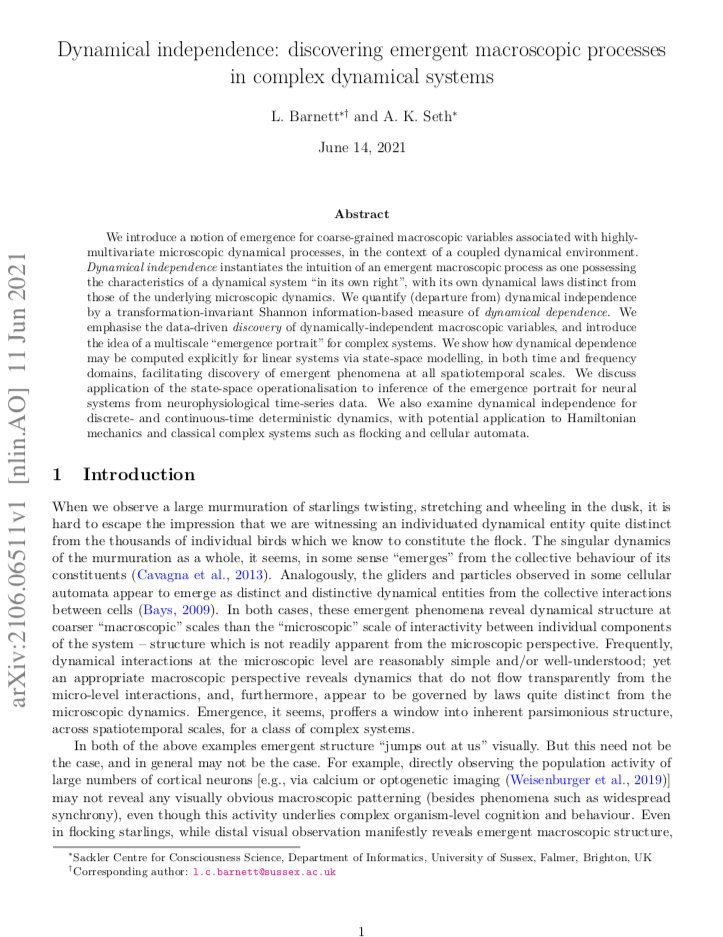
1/n How can we identify and measure ‘emergent’ processes in complex systems? Here’s a new #arXiv preprint addressing this question, by Lionel Barnett (@LionelBarnett2) and me. It’s all about ‘Dynamical Independence’. arxiv.org/abs/2106.06511. Thread:
2/n Emergence is a popular but difficult to grasp concept. We all have strong intuitions about when macroscopic processes ‘emerge’ from the micro-level constituents – as in flocks (murmurations) of starlings. 

3/n One context of particular interest is how, or whether, mental states – perhaps even conscious states – might ‘emerge’ from the collective dynamics of their underlying neural populations.
4/n In the 90s, the philosopher Mark Bedau distinguished between (spooky) ‘strong’ emergence, in which the macro is in principle inexplicable by the micro, and (non-spooky) metaphysically innocent, ‘weak’ emergence philpapers.org/rec/BEDWE
5/n In weak emergence (e.g., flocking starlings), the macro depends on the micro, but in complicated ways that are difficult to understand: the macro is ontologically reducible to micro-level causes but remains epistemically opaque from these causes
6/n There’ve been several prior approaches to measuring weak emergence, including my 2010 attempt via Granger causality bit.ly/3wtlut9, and others using partial information decompositions bit.ly/3wC4nFq (w/ @a_fernando_rosas, @PedroMediano, @adambarrett81 et al)
7/n Here, @LionelBarnett2 and I (well, very much Lionel) present a novel approach to both measuring and – critically – also *identifying* weakly emergent macroscopic processes from their underlying microscopic causal constituents. 

8/n Our notion of ‘Dynamical Independence’ (DI) captures the notion that emergent macro-level processes appear to have a ‘life of their own’, distinct from the micro-level dynamics that underlie the macro-level phenomena.
9/n We frame DI using information theory: a macro-level process is dynamically independent to the extent that, while driven by microscopic dynamics, knowledge of the microscopic process does not add to the ability of the macroscopic process to self-predict.
10/n Intuitively, DI operationalizes a ‘way of looking’ at systems that reveals emergent dynamics (‘coarse-grainings’), even when these emergent dynamics might not leap out to us (in the sense that flocking starlings leap out intuitively).
11/n We provide methods for identifying and quantifying all emergent macroscopic dynamics given the micro-level dynamics, for a non-trivial class of linear systems. The result is an ‘emergence portrait’ of a system, across multiple spatial and temporal scales. 

12/n We also discuss extending DI to other classes of dynamical systems, including discrete systems such as cellular automata, and continuous deterministic systems such as classical Hamiltonian mechanics.
13/13 Altogether, our approach facilitates the data-driven discovery of emergent macroscopic phenomena in a wide range of dynamical systems – with many potential applications including neural systems analysis. Here’s the paper again: arxiv.org/abs/2106.06511
(ps - posting this just after an excellent @24Assc @theassc salon on 'formal approaches to emergence: perspectives and potential applications) organised by @NadineSpychala - where we also discussed work of @erikphoel & colleagues.)
• • •
Missing some Tweet in this thread? You can try to
force a refresh



